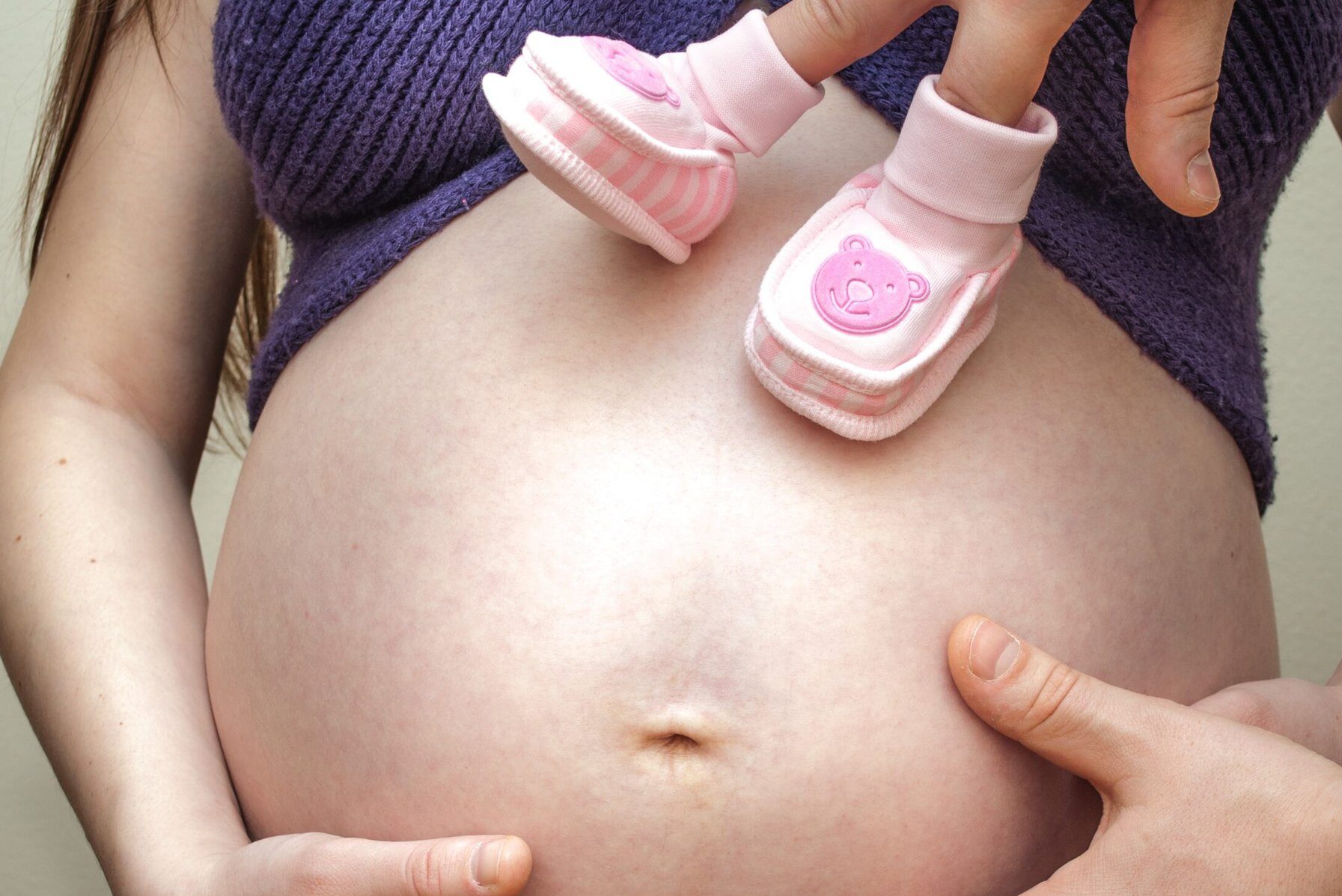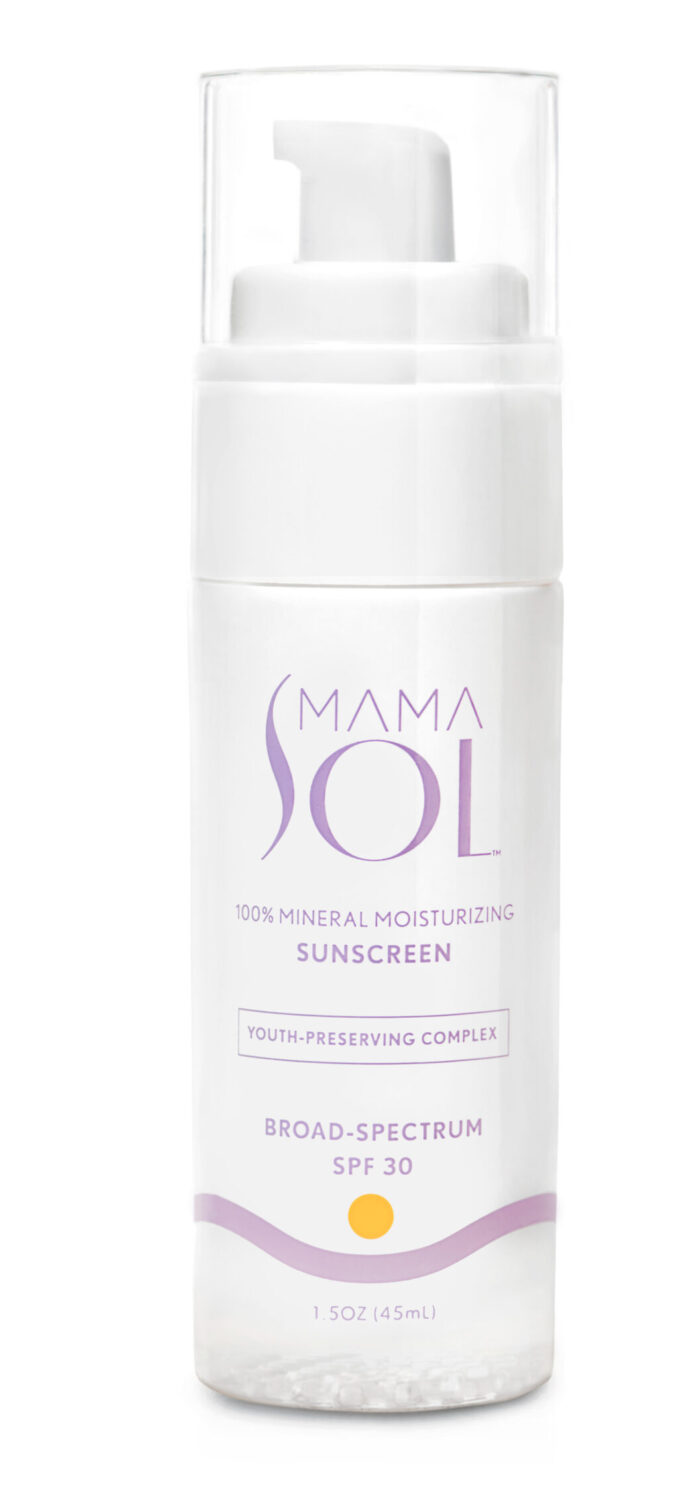I’ll never forget the one night, somewhere during the second trimester of my pregnancy with my first daughter, when I spent the hours from 2 to 4 am mentally cataloging all the beauty and skincare products I use in a day—soaps, serums, lotions, and potions—wondering if they were even safe during pregnancy.
Eventually, I moved on to thinking about the products I might one day use on the baby, and what those should be.
By the time the sun was close to rising, I’d settled on a total circling-the-drain tangle of thoughts about where, precisely, one puts diaper cream during and after a diaper change.
The point of this little story is actually not to shed light on how little sleep I got during parts of my pregnancy, but on just how anxious I was feeling about the entire category of “personal care products”—and how the combination of skincare, pregnancy, and my pre-existing anxiety disorder turned into the perfect diaper-cake of worries.
Anxiety that grows along with a belly? Doesn’t surprise Josie Howard, M.D., a psychodermatologist—a skin doc who also has a psychiatry degree—at the University of California, San Francisco. “Given that this is a major life change, some low-level anxiety is a normal, human response,” she says.
Then there’s clinically significant anxiety, which studies show hits a full one-fifth of women when pregnant, with peak rates during the first trimester. Other studies find that mood and anxiety disorders spike in both the first and third trimesters.
For some women, the anxiety can become all-consuming—and while it may not be a focus in What to Expect, some degree of skincare angst is likely something you can expect when you’re expecting. Why? The skin can serve as a displacement source for anxiety.
“They may not even name their experience as anxiety, but may become obsessively focused on the contents of their skincare,” says Dr. Howard. “It is helpful to name this experience as anxiety and treat the anxiety itself rather than feeding the obsession with skincare ingredients. This is usually best achieved through consultation with your OB, dermatologist, and mental health care provider.”
Of course, Googlers gonna Google, and there’s a lot of online sensationalism that can make you feel like you’re going to do serious harm to your baby if you slather on one wrong ingredient. We’re here to tamp down that angst.
Many classic ingredients are fine, and even some on the use-caution list still have little to no risk, says Rachel Nazarian, M.D., a dermatologist at Schweiger Dermatology in New York City. The big caution, she explains, “is against ‘toxic levels’ if ingested during pregnancy and embryo formation.” Topical application isn’t typically an issue if restricted to small areas (like the face) for limited durations, such as during pregnancy, she says.
So take a deep breath, and let’s stroll through the most-questioned beauty ingredients during pregnancy to clarify details—and offer a dose of calm.
Read More About Mental Health and Pregnancy
Sunscreen
There’s a lot of beauty-world debate about the safety of chemical sunscreens, which thwart UV rays by creating a chemical reaction in the skin, as opposed to mineral filters, which form a physical barrier on the skin’s surface but can be thick and chalky. Most dermatologists believe that using chemical sunscreen ingredients, such as oxybenzone or avobenzone, is just fine during non-pregnant times.
With a bé-bé in your uterus, however, chemical ‘screens are no longer your friend. “Oxybenzone is considered an endocrine disruptor, and in animal studies, it caused concerning cellular changes,” says Dr. Nazarian. “What does this mean in humans? We don’t know. But we have other equally effective and known safe options, so we recommend avoiding chemical sunscreens during pregnancy.”
Mineral sunscreens contain zinc or titanium dioxide, and may be less irritating to those with sensitive skin—another boon for the preggo set. Look for a formula that’s broad-spectrum (meaning it protects against UVA rays, too; SPF only works on UVB rays).
Mental Good Buy: Mama Sol 100% Mineral Moisturizing Sunscreen Broad-Spectrum SPF 30, $44. It also also contains antioxidants—L-carnosine, kakadu plum (a major source of vitamin C), and fatty acids—to further protect against sun-spewing, wrinkle-causing free radicals.
Because under-applying sunscreen is a national pastime, Mama Sol’s formula goes on white, so you can see where you’ve put it, but then blends in without a leftover cast. And unlike many mineral ‘screens, which can be tacky, Mama Sol’s functions as a daily moisturizer, thanks to coconut oil and hyaluronic acid. Editor’s Note: When you buy Mama Sol through Mental until August 31, a portion of the proceeds will go to Every Mother Counts, a nonprofit that supports maternal health in marginalized communities.
Acne Issues
Breakouts and adulthood: not fair. Breakouts and pregnancy: downright devilish. Alas, with hormones spinning—your body produces progesterone in the first two trimesters, which ratchets up your skin’s oil production—more than 40 percent of pregnant peeps get acne, whether they’ve had it before or not.
The two most popular and effective over-the-counter (OTC) zit-fighters—salicylic acid and benzoyl peroxide—are okay to use, despite the many articles you may have read suggesting otherwise. We repeat: Both are considered safe during pregnancy, according to the American College of Obstetricians and Gynecologists (ACOG).
But… Are you sure, Mental? Yes, say Dr. Nazarian and Audrey Merriam, M.D., an assistant professor of obstetrics, gynecology, and reproductive sciences at the Yale School of Medicine. And yes, that really does apply to benzoyl peroxide, often the subject of worry. “So little is absorbed, and it’s often used in such low concentrations for acne, from 2.5 to 5 percent,” says Dr. Nazarian. (Of course, as with any ingredient you’re using during pregnancy, be sure to mention this to your ob/gyn to ensure there are no extenuating circumstances.)
As for prescription antibiotics for acne, some topicals are fine to use during pregnancy, but you should avoid those associated with birth defects, such as azithromycin, clarithromycin, minocycline, tetracycline, and doxycycline. The oral prescription acne drug Accutane, which can cause birth defects, should not be taken when pregnant. Check out the ACOG for more info on antibiotic use for acne.
Wrinkle Treatments
If ever there were a beauty phrase repeated ad nauseum, it’s that “retinol is the gold standard for smoothing wrinkles.” But that gold gets tarnished during pregnancy.
Retinol, a vitamin A derivative, is the OTC version of prescription-strength retinoids like tretinoin (think: Retin-A). Some studies have found links between tretinoin and birth defects in fetuses, primarily when used early in pregnancy. And while other research—including reviews in The Journal of Clinical Pharmacology and British Journal of Dermatology—found no risk associated with the use of retinoids during pregnancy, study authors stopped short of green-lighting them due to the risk/benefit ratio.
Another reason to skip retinoids, given their penchant for aggravating skin: “The skin is so sensitive for many people during pregnancy– thanks to stretching of the skin, increased blood flow, and hormone changes—so it makes sense to avoid potentially irritating topicals if not specifically needed during this time,” says Dr. Nazarian.
Now, if you’ve been using retinoids and then find out you’re pregnant, stop using them but “do not freak out,” says Dr. Merriam, who herself is pregnant right now. (That British study we mentioned specifically confirms the “don’t freak out” bit.) “Systemic absorption of the topical products is low to a developing fetus, but larger trials are needed before we can truly feel safe about using them during pregnancy,” she says.
If you’re looking for a line-smoothing alternative during your 9 to 10 months gestating a human, try peptides. Mental Good Buy: Paula’s Choice Pro-Collagen Multi-Peptide Booster, $58.
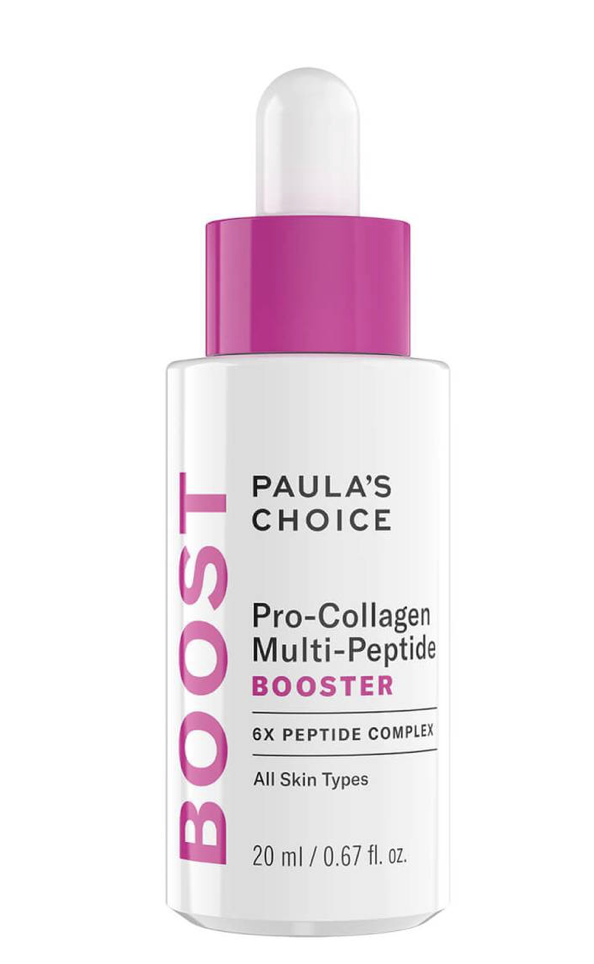
Brightening Products
Fluctuating hormones can cause the development of melasma, a darkening of skin referred to as “the mask of pregnancy,” because the hyperpigmented patches often appear in a mask shape, around the upper lip and cheeks. If it bothers you, there are ways to reduce the discoloration—but not all are created equally safe.
You may be tempted to reach for hydroquinone, the only FDA-approved OTC ingredient to lighten skin—but don’t. In one study about skincare and pregnancy, hydroquinone was one of the only ingredients researchers suggest avoiding, in part because 35 to 45 percent gets absorbed into the skin, a high amount for skincare actives. (Used it before you knew you were pregnant? It’s ok. As Dr. Merriam points out, “Hydroquinone does not appear to be associated with increased risk of malformations or adverse pregnancy outcomes, but the data is sparse.”)
Glycolic acid is a classic brightener, and while that same pregnancy study gave it a pass, the authors did note that it has shown “adverse reproductive effects” in animal studies; now, the amount of glycolic acid used to produce those negative effects was way higher than any human would rub on their face. But why chance it?
Dr. Nazarian recommends azelaic acid, which has strong safety data. An exfoliating ingredient that sloughs away the surface level of skin, azelaic acid also boasts antityrosinase properties. Tyrosinase is an enzyme that helps produce melanin, a necessary skin function but one that can go into overdrive and create too much pigment in certain spots.
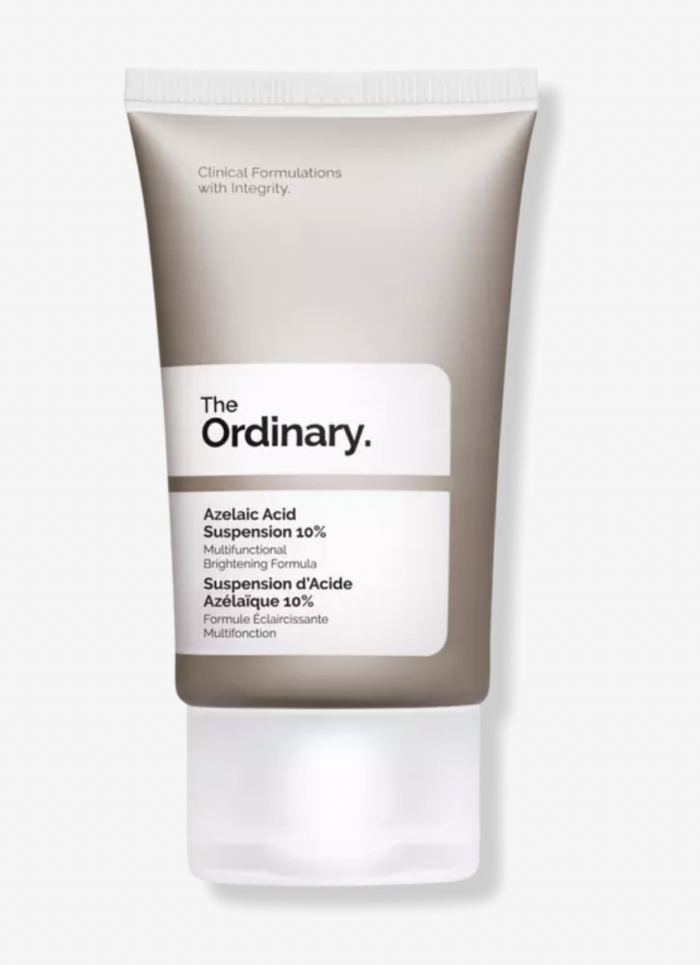
For additional coverage, a mineral foundation can help even out your tone. Mental Good Buy: L’Oréal Paris Minéral Gentle Mineral Makeup SPF 19, $9.46.
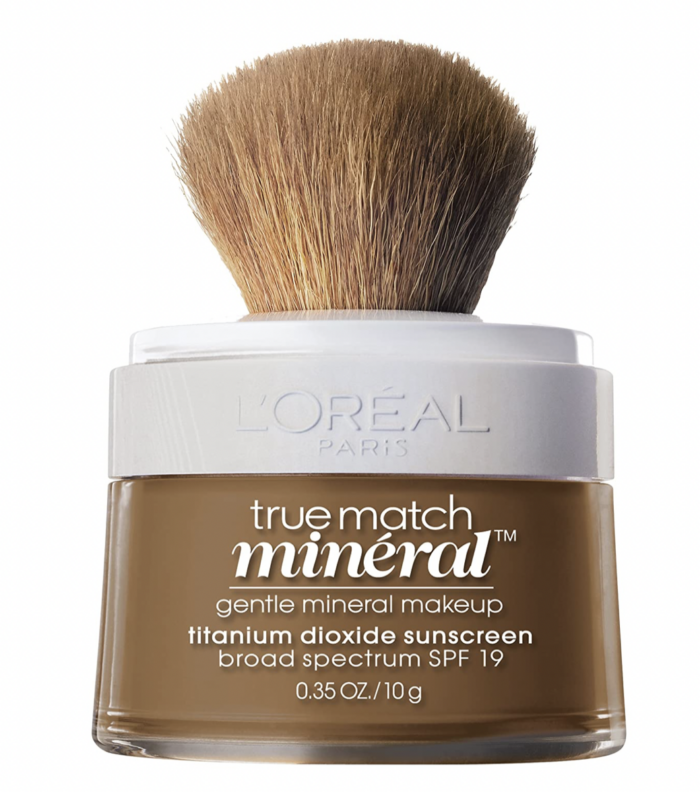
Cleansers
Wash your face with whatever you like. Cleansers aren’t on the skin for very long, so any ingredient absorption is extremely low, says Dr. Nazarian.
You may have heard that sulfates, often found in cleansers, are a dirty word, but they’re only guilty of stripping away more of your natural skin oils than necessary, says Dr. Nazarian. So while they’re safe, your face could get dry, irritated, or itchy—“three things that aren’t a huge deal but that you certainly aren’t keen on during pregnancy,” she says.
With all the sulfate-free options available now, it’s easy to make the switch. If you have zits or oily skin, look for a gel formula. Mental Good Buy: Starface x Hello Kitty Space Wash Gentle Foaming Cleanser, $12.99. (Never has sulfate-free been so adorbs.)
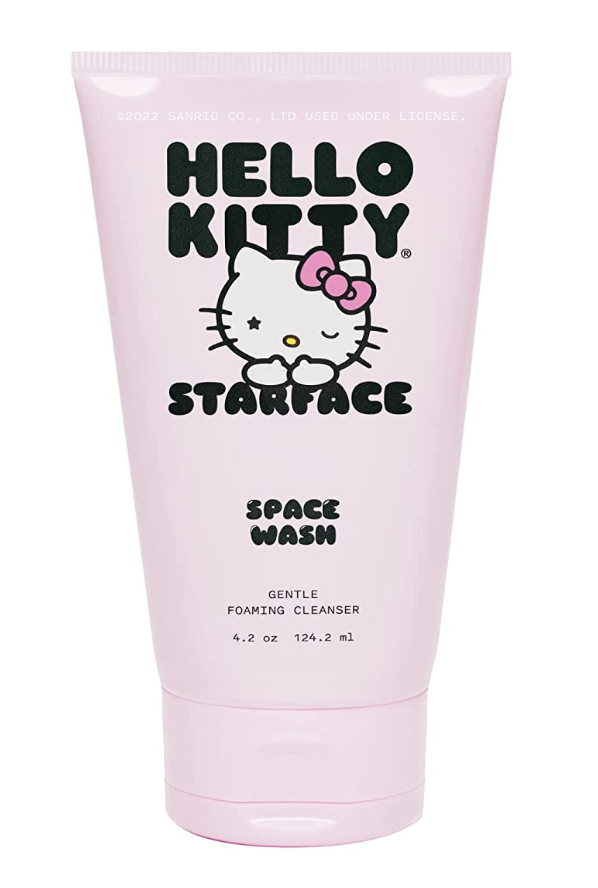
For dry skin, choose a creamy formula labeled “sensitive skin” to keep your face soft and hydrated. Mental Good Buy: Aveeno Calm + Restore Nourishing Oat Cleanser, $9.19.
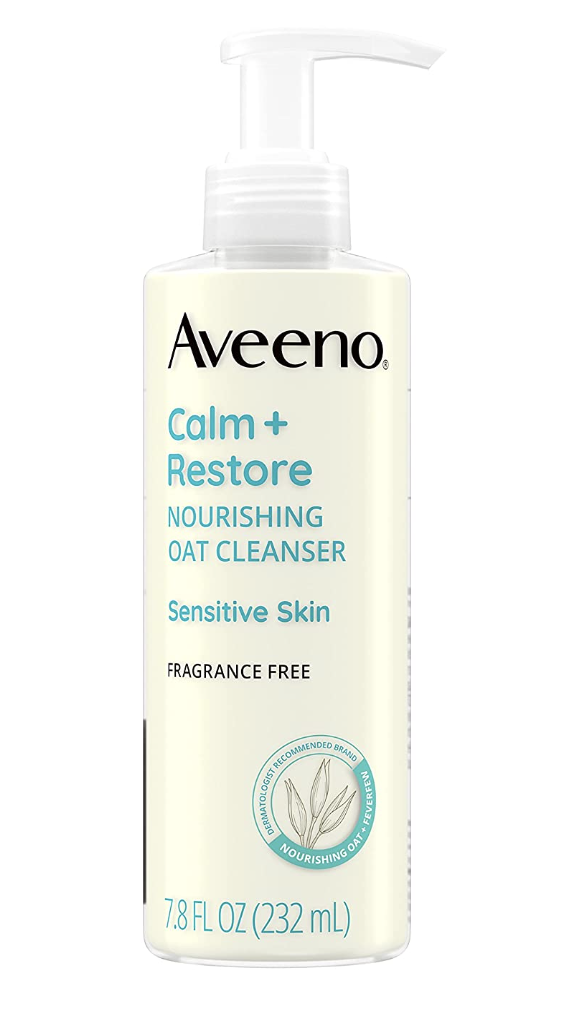
And for body skin, reach for our favorite pump anytime we’re feeling particularly prickly. Mental Good Buy: Dove Sensitive Skin Body Wash, $26.91 for a 3-pack.
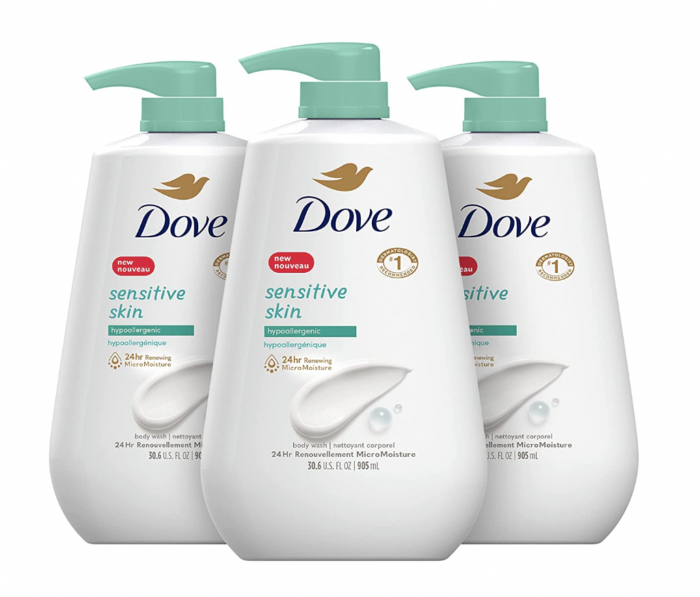
Nail Products
Ever heard the word phthalates? And if you have, any clue how to pronounce it? (It’s fuh-th-al-ates, BTW.) They’re chemicals used in all kinds of products, including nail polish, where they function as plasticizers, making lacquer less prone to cracking.
Recent research in the journal Environmental Health Perspectives found an association between phthalates and elevated blood pressure late in pregnancy—which is a potential risk factor for preterm birth and preeclampsia. BUT! Dr. Merriam stresses that even this study shows “correlation, not causation.” Not to mention that “it’s nearly impossible to avoid phthalates entirely, and virtually all individuals in the U.S. have detectable levels in their bodies,” she says.
“I think we will continue to learn more about phthalates and their effects on pregnancy and human health in general, but for pregnancy, I would not stress about trying to avoid them entirely.” Her advice is to focus on higher-risk factors for preterm birth and preeclampsia—things like smoking, pregestational diabetes, and chronic hypertension.
That said, there are a zillion polishes—often labeled “non-toxic”—that ban phthalates along with other chemical baddies like formaldehyde and questionables like parabens. Mental Good Buy: Sally Hansen Good. Kind. Pure. Lasting Color, $9, which is free of 16 potentially concerning chemicals and even employs plant-based brush bristles.
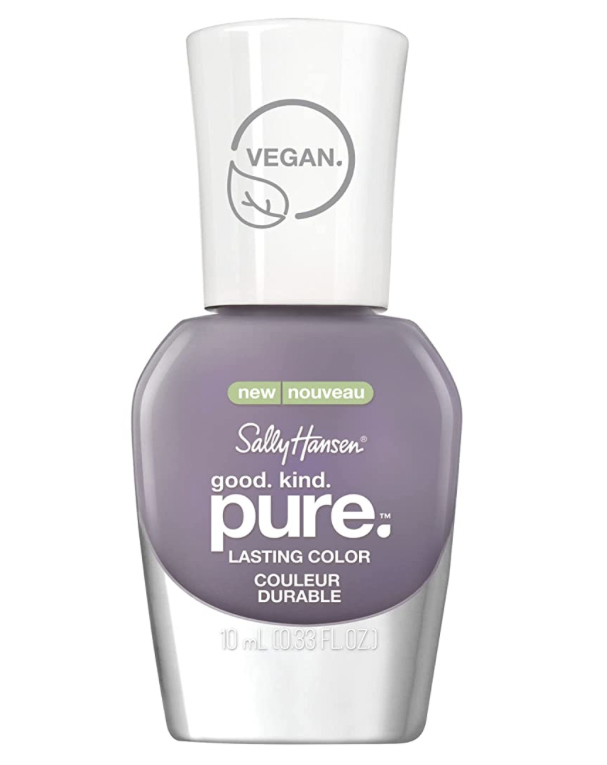
Body Lotion
Speaking of parabens, they’re found in tons of beauty products, not just nail polish, primarily used as preservatives. There has been concerning research that parabens may be endocrine disruptors, meaning they can mess with your hormone levels. Dr. Nazarian is careful to note, however, that parabens have not been conclusively proven to be dangerous—a stance the ACOG also stresses in its most recent clinical guidance paper.
Still, there’s no need to slather parabens over large swaths of your body; you can find many a lotion without them. Eyeball labels for any ingredient that has “paraben” in the suffix, à la methylparaben or butylparaben. Mental Good Buy: La Roche-Posay Lipikar Triple Repair Moisturizing Cream, $19.99, which is so gentle, it’s got the National Eczema Association seal of approval.
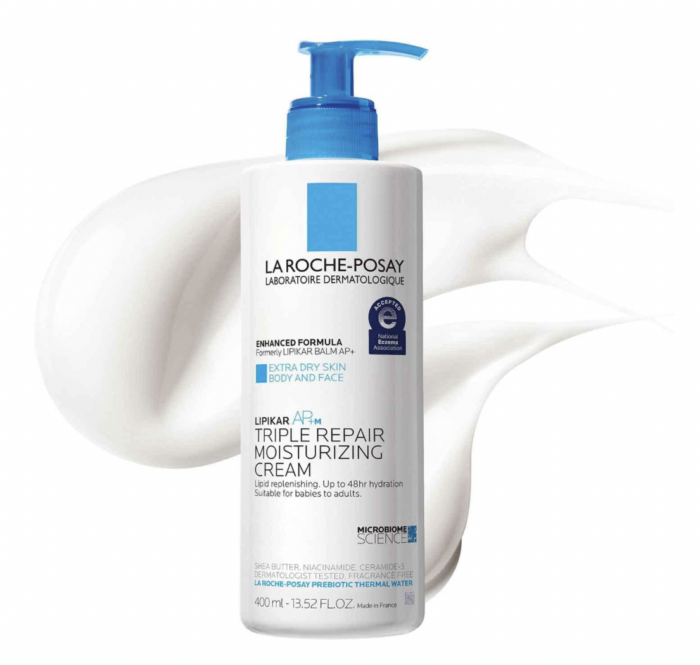
Hair Color and Treatments
To dye or not to dye… That is the question, and here is the answer: You do not need to forgo highlights or gray touch-ups during pregnancy, says Dr. Nazarian.
The issue with hair-dye chemicals is primarily for salon workers who are exposed all the time, says Dr. Nazarian, who points to a 2021 study urging concern for hairdressers. “For the rest of our average hair-dying population, having a dye job once a trimester is nothing to be worried about,” she says.
On the other hand, if you get keratin treatments or other chemical smoothing services that involve formaldehyde—a known carcinogen that’s sometimes called formalin or methylene glycol—you may want to pause during pregnancy. While there aren’t many clinical trials on how these ingredients can impact a fetus, says Dr. Nazarian, some research has ID’d a link between formaldehyde and miscarriage risk for people who work around the chemicals.
In sum… When you’re worried about what you’re putting on (or into) your skin, hair, or nails during pregnancy, have a chat with your healthcare provider for peace of mind. Consider it a part of nesting. “There’s something about going through one’s worry list and dividing it, out loud with another person, into things one can control and things one cannot that is very productive and illuminating,” says Dr. Howard. “It can be empowering, even enjoyable, to help focus one’s efforts.”
Plus, it does another thing that’s so important during pregnancy, she adds: “It minimizes being anxious about being anxious.”
Sign up for our free newsletter
Legit tips and cool copes, delivered straight to your inbox.
By completing this form you are signing up to receive our emails and can unsubscribe anytime.
Josie Howard, M.D.: https://josiehowardmd.com
Generalized Anxiety Disorder in Pregnancy: https://pubmed.ncbi.nlm.nih.gov/21269708/
Anxiety During and Post-Pregnancy: https://www.ncbi.nlm.nih.gov/pmc/articles/PMC6839961/
Acne During Pregnancy Info: https://unmhealth.org/stories/2022/06/pregnancy-acne-top-questions-answered.html
Acne During Pregnancy Study: https://www.ncbi.nlm.nih.gov/pmc/articles/PMC5555287/
Topical Tretinoin During Pregnancy: https://www.ncbi.nlm.nih.gov/books/NBK582989/
Retinoids in The Journal of Clinical Pharmacology: https://pubmed.ncbi.nlm.nih.gov/22174426/
Retinoids in the British Journal of Dermatology: https://pubmed.ncbi.nlm.nih.gov/26215715/
Glycolic Acid and Hydroquinone During Pregnancy: https://www.ncbi.nlm.nih.gov/pmc/articles/PMC3114665/#b8-0570665
Azelaic Acid and Tyrosinase: https://pubmed.ncbi.nlm.nih.gov/8654129/
Formaldehyde and Hair Treatments: https://www.fda.gov/consumers/consumer-updates/formaldehyde-hair-smoothing-products-what-you-should-know
Formaldehyde Treatments and Miscarriage Risk: https://www.ncbi.nlm.nih.gov/books/NBK582739/
Phthalates and Pregnancy: https://ehp.niehs.nih.gov/doi/full/10.1289/EHP8562
Parabens and the Endocrine System: https://pubmed.ncbi.nlm.nih.gov/29596967/
Hairdressers and Hair Dye Chemicals: https://www.mdpi.com/1660-4601/18/22/11748
ACOG Clinical Guidance Paper: https://www.acog.org/clinical/clinical-guidance/committee-opinion/articles/2021/07/reducing-prenatal-exposure-to-toxic-environmental-agents
ACOG and Hair Dye During Pregnancy: https://www.acog.org/womens-health/experts-and-stories/ask-acog/is-it-safe-to-dye-my-hair-during-pregnancy
